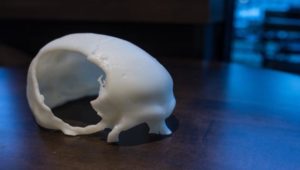
How to prevent roadway accidents?
I have friends that would not have given the slightest thought about this question until they received their traumatic brain injuries (TBI). Listen to their stories.
Nicole was ten years old when she moved to Maryland and learned the importance of prioritizing roadway safety. She befriended her new neighbor, a girl just a year older than her, and went out for a bike ride. This girl led the way through trails, across roads, and through the town, until she heard a loud thud from behind and realized Nicole was not following her anymore. The befuddled girl looked back and saw Nicole lying on the pavement of the road, displaced ten feet from a car, with glass shards all around her unconscious body.
Dawson was a sophomore in high school when he grasped the importance of prioritizing driver safety. Dawson normally worked night shift at a factory and had no trouble driving himself home, despite the drowsiness he incurred. However, one night he over shot his luck and fell asleep at the wheel, smashing into a tree at 50 MPH. Instead of waking up in the comfort of his own bed like normal, he woke up from his week-long coma in the hospital.
I was seventeen when the importance of prioritizing both driver and roadway safety came to my attention. On September 18, 2015, I was riding a skateboard without a helmet, two houses down from my home, in a conservative subdivision, when a speeding black Lexus plunged into my body. I was immediately comatose for the next thirty days. I lost approximately half of my skull, in part due to the craniotomy, but largely because of the impact itself. The doctors diagnosed me with a severe diffuse axonal brain injury down to my brainstem. My cognitive damages forced me to relearn how to walk, talk, and perform basic arithmetic.
Nonetheless, I made a remarkable recovery from my injury, and, in many ways, I am blessed. I feel obligated to speak on the issue of roadway safety for the sake of those who cannot, or are at least not in a position to say what they wish others knew before their blunder begins.
I was asked to speak on the topic of roadway and driver safety to a group of board leaders at Cummins, a Fortune 500 Company, in Columbus, IN. Using my own experience, I expressed my concerns: (1) non-walking pedestrians need helmets and (2) drivers need to be more attentive to their fast-paced environment. The driver who hit me reported not looking at the road because he was looking at his friend’s home. I likely would not have received the severe amounts of brain and skull damage if I was wearing a helmet.
It’s a tragic truth that people tend to not do the right thing until they face the consequences for doing the wrong thing. What’s even more tragic is that, in this context, people who experience the consequences for their actions do not usually live to warn others. If they do live, they tend to live below the social radar and nobody wants to listen to them as time goes on. Once the excitement of the injury dies, people swipe passed the old and look for the new, not realizing that the next big headline to Tweet or share on Facebook could be their own head.
In conclusion, prioritizing roadway and driver safety is so vital because not only are human lives at stake, but so is the quality of human life—something my TBI friends will gladly attest to if they could.
The following image is a life-sized replica of my skull to this day from a 3D printer. A nurse gave this to me after my last brain surgery December 23, 2015. This was used to make the bone-like prosthetic for my new skull.


